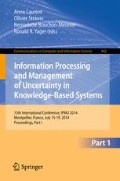Abstract
We introduce in this paper a quantitative preference based argumentation system relying on ASPIC argumentation framework and fuzzy set theory. The knowledge base is fuzzified to allow the experts to express their expertise (premises and rules) attached with grades of importance in the unit interval. Arguments are attached with a score aggregating the importance expressed on their premises and rules. Extensions are then computed and the strength of each of which can also be obtained based on its strong arguments. The strengths are used to rank fuzzy extensions from the strongest to the weakest one, upon which decisions can be made. The approach is finally used for decision making in a real world application within the EcoBioCap project.
Access this chapter
Tax calculation will be finalised at checkout
Purchases are for personal use only
Preview
Unable to display preview. Download preview PDF.
References
Amgoud, L., Bonnefon, J.F., Prade, H.: An argumentation-based approach to multiple criteria decision. In: Godo, L. (ed.) ECSQARU 2005. LNCS (LNAI), vol. 3571, pp. 269–280. Springer, Heidelberg (2005)
Modgil, S., Prakken, H.: A general account of argumentation with preferences. Artificial Intelligence 195, 361–397 (2013)
Amgoud, L., Vesic, S.: Repairing preference-based argumentation frameworks. In: 21st International Joint Conference on Artificial Intelligence, pp. 665–670 (2009)
Amgoud, L., Vesic, S.: Handling inconsistency with preference-based argumentation. In: Deshpande, A., Hunter, A. (eds.) SUM 2010. LNCS, vol. 6379, pp. 56–69. Springer, Heidelberg (2010)
Yager, R.R.: General multiple-objective decision functions and linguistically quantified statements. Inter. Jour. of Man-Machine Studies 21(5), 389–400 (1984)
Dung, P.M.: On the acceptability of arguments and its fundamental role in nonmonotonic reasoning, logic programming and n-persons games. Artificial Intelligence 77(2), 321–357 (1995)
Prakken, H.: An abstract framework for argumentation with structured arguments. Argument and Computation 1(2), 93–124 (2011)
Amgoud, L., Bodenstaff, L., Caminada, M., McBurney, P., Parsons, S., Prakken, H., Veenen, J., Vreeswijk, G.: Final review and report on formal argumentation system.deliverable d2.6 aspic. Technical report (2006)
Zadeh, L.: Fuzzy sets. Information and Control 8(3), 338–353 (1965)
Bouchon-Meunier, B., Dubois, D., Godo, L., Prade, H.: Fuzzy set and possibility theory in approximate and plausible reasoning. The Handbook of fuzzy sets. In: Fuzzy sets in Approximate Reasoning and Information Systems, pp. 27–31. Kluwer Academic Publishers (1999)
Caminada, M., Amgoud, L.: On the evaluation of argumentation formalisms. Artificial Intelligence 171, 286–310 (2007)
Tamani, N., Croitoru, M.: Fuzzy argumentation system for decision making. Technical report, INRIA LIRMM (2013), https://drive.google.com/file/d/0B0DPgJDRNwbLdE5wdzFQekJocXM/edit?usp=sharing
Destercke, S., Buche, P., Guillard, V.: A flexible bipolar querying approach with imprecise data and guaranteed results. Fuzzy Sets and Systems 169, 51–64 (2011)
Chesñevar, C.I., Simari, G.R., Alsinet, T., Godo, L.: A logic programming framework for possibilistic argumentation with vague knowledge. In: Proc. of the 20th Conference on Uncertainty in Artificial Intelligence, UAI 2004, pp. 76–84 (2004)
Alsinet, T., Chesñevar, C.I., Godo, L., Simari, G.R.: A logic programming framework for possibilistic argumentation: Formalization and logical properties. Fuzzy Sets and Systems 159(10), 1208–1228 (2008)
Alsinet, T., Chesñevar, C.I., Godo, L., Sandri, S., Simari, G.R.: Formalizing argumentative reasoning in a possibilistic logic programming setting with fuzzy unification. International Journal of Approximate Reasoning 48(3), 711–729 (2008)
García, A.J., Simari, G.R.: Defeasible logic programming: an argumentative approach. Theory Pract. Log. Program. 4(2), 95–138 (2004)
da Costa Pereira, C., Tettamanzi, A.G.B., Villata, S.: Changing one’s mind: Erase or rewind? possibilistic belief revision with fuzzy argumentation based on trust. In: Proc. of the 22nd IJCAI, pp. 164–171 (2011)
Gratie, C., Florea, A.M.: Fuzzy labeling for argumentation frameworks. In: McBurney, P., Parsons, S., Rahwan, I. (eds.) ArgMAS 2011. LNCS, vol. 7543, pp. 1–8. Springer, Heidelberg (2012)
Stranders, R., de Weerdt, M., Witteveen, C.: Fuzzy argumentation for trust. In: Sadri, F., Satoh, K. (eds.) CLIMA VIII 2007. LNCS (LNAI), vol. 5056, pp. 214–230. Springer, Heidelberg (2008)
Janssen, J., Vermeir, D., De Cock, M.: Fuzzy argumentation frameworks. In: Proc. of 12th IPMU, pp. 513–520 (2008)
Kaci, S., Labreuche, C.: Argumentation framework with fuzzy preference relations. In: Hüllermeier, E., Kruse, R., Hoffmann, F. (eds.) IPMU 2010. LNCS, vol. 6178, pp. 554–563. Springer, Heidelberg (2010)
Letia, I.A., Groza, A.: Towards pragmatic argumentative agents within a fuzzy description logic framework. In: McBurney, P., Rahwan, I., Parsons, S. (eds.) ArgMAS 2010. LNCS, vol. 6614, pp. 209–227. Springer, Heidelberg (2011)
Author information
Authors and Affiliations
Editor information
Editors and Affiliations
Rights and permissions
Copyright information
© 2014 Springer International Publishing Switzerland
About this paper
Cite this paper
Tamani, N., Croitoru, M. (2014). Fuzzy Argumentation System for Decision Support. In: Laurent, A., Strauss, O., Bouchon-Meunier, B., Yager, R.R. (eds) Information Processing and Management of Uncertainty in Knowledge-Based Systems. IPMU 2014. Communications in Computer and Information Science, vol 442. Springer, Cham. https://doi.org/10.1007/978-3-319-08795-5_9
Download citation
DOI: https://doi.org/10.1007/978-3-319-08795-5_9
Publisher Name: Springer, Cham
Print ISBN: 978-3-319-08794-8
Online ISBN: 978-3-319-08795-5
eBook Packages: Computer ScienceComputer Science (R0)

